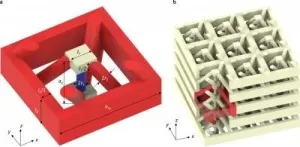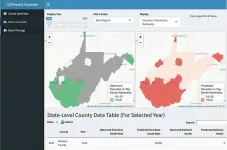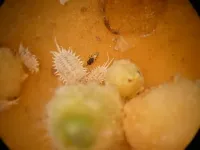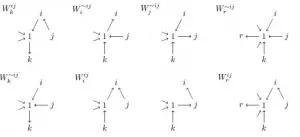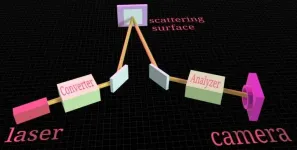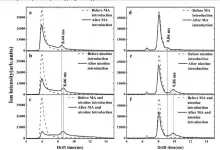Humans are ready to take advantage of benevolent AI
2021-06-10
(Press-News.org) Humans expect that AI is Benevolent and trustworthy. A new study reveals that at the same time humans are unwilling to cooperate and compromise with machines. They even exploit them.
Picture yourself driving on a narrow road in the near future when suddenly another car emerges from a bend ahead. It is a self-driving car with no passengers inside. Will you push forth and assert your right of way, or give way to let it pass? At present, most of us behave kindly in such situations involving oth-er humans. Will we show that same kindness towards autonomous vehicles?
Using methods from behavioural game theory, an international team of researchers at LMU and the University of London have conducted large-scale online studies to see whether people would behave as cooperatively with artificial intelligence (AI) systems as they do with fellow humans.
Cooperation holds a society together. It often requires us to compromise with others and to accept the risk that they let us down. Traffic is a good example. We lose a bit of time when we let other people pass in front of us and are outraged when others fail to reciprocate our kindness. Will we do the same with machines?
Exploiting the machine without guilt
The study which is published in the journal iScience found that, upon first encounter, people have the same level of trust toward AI as for human: most expect to meet someone who is ready to cooperate.
The difference comes afterwards. People are much less ready to reciprocate with AI, and instead exploit its benevolence to their own benefit. Going back to the traffic example, a human driver would give way to another human but not to a self-driving car.
The study identifies this unwillingness to compromise with machines as a new challenge to the future of human-AI interactions.
"We put people in the shoes of someone who interacts with an artificial agent for the first time, as it could happen on the road," explains Dr. Jurgis Karpus, a behavioural game theorist and a philosopher at LMU Munich and the first author of the study. "We modelled different types of social encounters and found a consistent pattern. People expected artificial agents to be as cooperate as fellow humans. However, they did not return their benevolence as much and exploited the AI more than humans."
With perspectives from game theory, cognitive science, and philosophy, the researchers found that 'al-gorithm exploitation' is a robust phenomenon. They replicated their findings across nine experiments with nearly 2,000 human participants.
Each experiment examines different kinds of social interactions and allows the human to decide whether to compromise and cooperate or act selfishly. Expectations of the other players were also measured. In a well-known game, the Prisoner's Dilemma, people must trust that the other characters will not let them down. They embraced risk with humans and AI alike, but betrayed the trust of the AI much more often, to gain more money.
"Cooperation is sustained by a mutual bet: I trust you will be kind to me, and you trust I will be kind to you. The biggest worry in our field is that people will not trust machines. But we show that they do!" notes Prof. Bahador Bahrami, a social neuroscientist at the LMU, and one of the senior researchers in the study. "They are fine with letting the machine down, though, and that is the big difference. People even do not report much guilt when they do," he adds.
Benevolent AI can backfire
Biased and unethical AI has made many headlines--from the 2020 exams fiasco in the United Kingdom to justice systems--but this new research brings up a novel caution. The industry and legislators strive to ensure that artificial intelligence is benevolent. But benevolence may backfire.
If people think that AI is programmed to be benevolent towards them, they will be less tempted to co-operate. Some of the accidents involving self-driving cars may already show real-life examples: drivers recognize an autonomous vehicle on the road, and expect it to give way. The self-driving vehicle meanwhile expects for normal compromises between drivers to hold.
"Algorithm exploitation has further consequences down the line. If humans are reluctant to let a polite self-driving car join from a side road, should the self-driving car be less polite and more aggressive in order to be useful?" asks Jurgis Karpus.
"Benevolent and trustworthy AI is a buzzword that everyone is excited about. But fixing the AI is not the whole story. If we realize that the robot in front of us will be cooperative no matter what, we will use it to our selfish interest," says Professor Ophelia Deroy, a philosopher and senior author on the study, who also works with Norway's Peace Research Institute Oslo on the ethical implications of inte-grating autonomous robot soldiers along with human soldiers. "Compromises are the oil that make soci-ety work. For each of us, it looks only like a small act of self-interest. For society as a whole, it could have much bigger repercussions. If no one lets autonomous cars join the traffic, they will create their own traffic jams on the side, and not make transport easier".
INFORMATION:
ELSE PRESS RELEASES FROM THIS DATE:
2021-06-10
As COVID-19 restrictions ease nationwide and more people host indoor gatherings, investing in a high efficiency particulate air (HEPA) purifier might not be a bad idea, says a University of Cincinnati College of Medicine researcher.
Several published studies evaluating aerosols and submicron particles similar in size to the SARS-CoV-2 virion have shown that portable HEPA purifiers are able to significantly reduce airborne COVID-19 particles, says Ahmad Sedaghat, MD, PhD, director of the UC Division of Rhinology, Allergy and Anterior Skull Base Surgery.
Sedaghat identified the medical literature showing published studies on the effectiveness ...
2021-06-10
Acoustic waves in gases, liquids, and solids usually travel at an almost constant speed of sound. So-called rotons are an exception: their speed of sound changes significantly with the wavelength, and it is also possible that the waves travel backwards. Researchers at Karlsruhe Institute of Technology (KIT) are studying the possibilities of using rotons in artificial materials. These computer-designed metamaterials, produced by ultra-precise 3D laser printing, might be used in the future to manipulate or direct sound in ways that have never been possible before. A report on the researchers' work has been published in Nature Communications. (DOI: 10.1038/s41467-021-23574-2)
Rotons are quasiparticles, which means that they behave ...
2021-06-10
New Orleans, LA - Research conducted at LSU Health New Orleans Neuroscience Center of Excellence reports that Elovanoids, bioactive chemical messengers made from omega-3 very-long-chain polyunsaturated fatty acids discovered by the Bazan lab in 2017, may block the virus that causes COVID-19 from entering cells and protect the air cells (alveoli) of the lung. Their findings are published online in Scientific Reports, available here.
"Because the compounds are protective against damage in the brain and retina of the eye and the COVID-19 virus clearly damages the lung, ...
2021-06-10
Fraud is going uninvestigated by police who are "hiding behind the veil" of the Action Fraud national crime reporting agency.
In his paper published this week in Policing, Professor Mark Button, director of the Centre for Counter Fraud Studies at the University of Portsmouth argues that, Action Fraud, which has been widely derided, has become a useful veil from which the police can hide their inadequate response.
Figures from Action Fraud, the arm of the police responsible for recording scams and fraud, show that between 2019 and 2020, over 800,000 people reported being a victim of fraud, with £2.3bn finding its way into criminal hands. However, Professor Button calculated just 0.6 per cent of police officers ...
2021-06-10
For two decades, the number of Americans who die each year from drug overdoses has steadily risen, from less than 20,000 in 1999 to more than 80,000 in 2020. By studying patterns of these drug-related fatalities, researchers at University of California San Diego School of Medicine, San Diego State University (SDSU), and international collaborators have designed and validated a prediction model to signal counties at risk of future overdose death outbreaks. The goal of the open-source tool is to predict and prevent deaths through early deployment of public health resources.
Findings were published June 9, 2021 by Lancet Public Health.
"A big challenge for public health experts is figuring out which parts of the country are at greatest risk of ...
2021-06-10
WASHINGTON -- In a new study, researchers show that the fiber optic cables that carry data across the world's oceans can also be used to sense geophysical events and monitor ocean and seafloor conditions.
Although buoys and cabled observatories can be used to monitor parts of the ocean, the information they provide is limited to their immediate surroundings. The new approach could offer a way to use the global network of subsea fiber optic cables to study otherwise inaccessible parts of the ocean.
"Once perfected, this new technique will allow geophysical sensing in the ocean depths, which are largely unexplored because of a lack of instrumentation that works in this environment," said Zhongwen Zhan, assistant professor of geophysics at Caltech. ...
2021-06-10
A CABI-led study has revealed that the success of Classical Biological Control (CBC) in Europe, North Africa and the Middle East is only rarely dependent on the released biological control agent, but more often on other factors, such as the target pest, its host plant, or the circumstances of the releases.
The research - published in the journal NeoBiota - suggests that the overall success of biological control introductions of insect predators and parasitoids against herbivorous insects in the Western Paleartic ecozone is comparable to the success of CBC worldwide. However, over 100 years of CBC in this region, has resulted in no overall rise in success in the fight against insect pests - including those of crops such as citrus, olive, potato, ...
2021-06-10
The COVID-19 pandemic has made clear the importance of understanding precisely how diseases spread throughout networks of transportation. However, rigorously determining the connection between disease risk and changing networks--which either humans or the environment may alter--is challenging due to the complexity of these systems. In a paper publishing on Thursday in the END ...
2021-06-10
Quantum coherence is a key ingredient in many fundamental tests and applications of quantum technology including quantum communication, imaging, computing, sensing and metrology. However, the transfer of quantum coherence in free-space has so far been limited to direct line-of-sight channels as atmospheric turbulence and scattering degrade the quality of coherence severely.
In a new paper published in Light: Science & Applications, researchers from the University of Waterloo have successfully demonstrated the transfer and recovery of quantum coherence using photons scattered in free-space ...
2021-06-10
Recently, a research group led by CHU Yannan and HUANG Chaoqun from the Institute of Health & Medical Technology of the Hefei Institutes of Physical Science (HFIPS) developed an effective method for on-site detection of methamphetamine (MA) in the presence of nicotine by a homemade ion mobility spectrometry. Relevant results were published in Analytical and Bioanalytical Chemistry.
MA is a highly addictive stimulant that affects the central nervous system. The on-site rapid detection of trace amounts of MA and screening illicit drugs in clandestine laboratories are important for drug enforcement agencies and the forensic community in general. However, detecting MA in the ...
LAST 30 PRESS RELEASES:
[Press-News.org] Humans are ready to take advantage of benevolent AI

